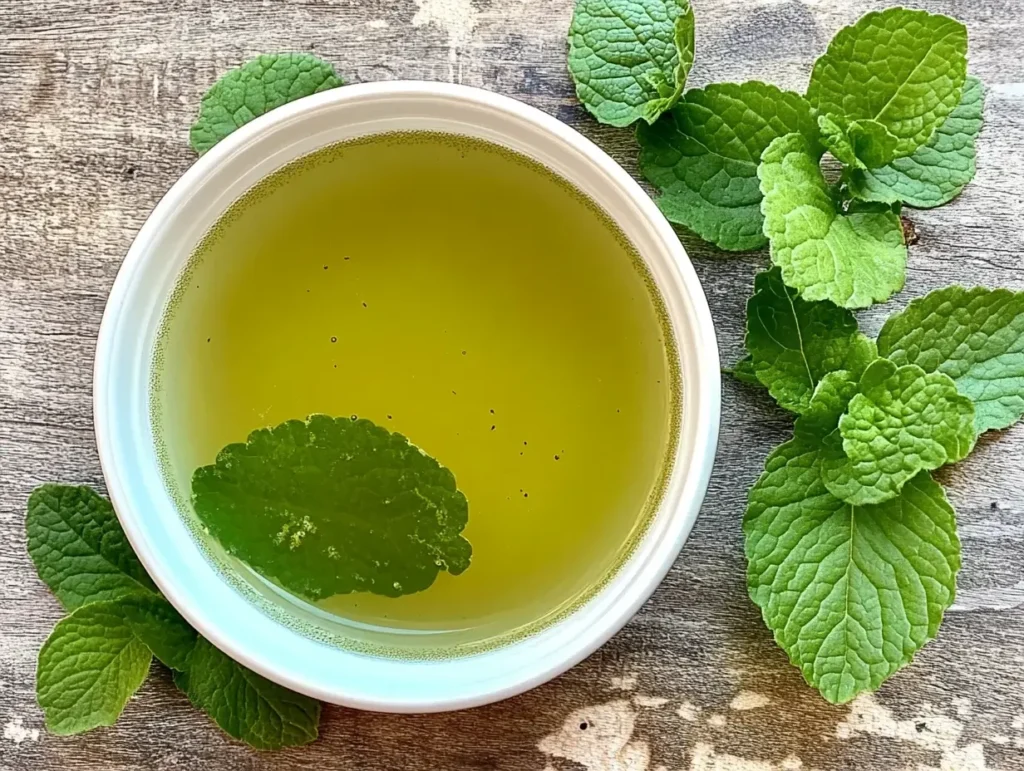Last Updated on May 9, 2025 by Souhail
Curious if lemon balm can make you lose weight? While it’s not a quick-fix fat burner, this calming herb might give your wellness routine a gentle boost. Known for its soothing effects on stress and digestion, lemon balm could play a supporting role in weight management, especially if anxiety or blood sugar swings tend to throw your goals off track.
Rich in antioxidants and easy to brew into a tea or add to supplements, lemon balm works best as part of a balanced lifestyle. It’s not about overnight results, but rather a natural nudge toward better digestion, reduced inflammation, and a calmer mind. Let’s take a closer look at how lemon balm might help you feel more in control of your health and your weight.
Table of contents
How Lemon Balm Could Support Weight Loss

1. Stress Reduction and Cortisol Control
One of lemon balm’s most studied benefits is its ability to reduce stress. Chronic stress elevates cortisol levels, which can lead to weight gain by increasing appetite, promoting fat storage (especially around the abdomen), and slowing metabolism.
Lemon balm’s calming effects stem from compounds like rosmarinic acid, which interacts with gamma-aminobutyric acid (GABA) receptors in the brain. This interaction promotes relaxation and lowers stress levels, making it easier to avoid emotional eating and curb cravings.
What the Research Says
In a 2014 study published in Advances in Pharmacological Sciences, participants who consumed lemon balm reported reduced stress and anxiety. By lowering cortisol, lemon balm indirectly supports a more balanced weight-management routine.
2. Improved Digestion
Healthy digestion is a cornerstone of effective weight management. Bloating, indigestion, or irregular bowel movements can make you feel heavier and hinder nutrient absorption. Lemon balm acts as a natural carminative herb, meaning it can relieve digestive discomfort, reduce bloating, and promote gut health.
Potential Effects on Gut Microbiota
Emerging research suggests that lemon balm may positively influence gut bacteria, which play a crucial role in metabolism and weight regulation. A healthy gut microbiome can help prevent obesity-related inflammation and improve your body’s ability to process food effectively.
3. Blood Sugar Regulation
Stable blood sugar levels are essential for controlling appetite and avoiding sudden cravings. Studies on lemon balm’s effects on blood sugar suggest that it might help regulate glucose levels. By improving insulin sensitivity, lemon balm could prevent the energy crashes that often lead to overeating or reaching for unhealthy snacks.
A 2010 study in Phytomedicine found that lemon balm extract significantly reduced blood glucose levels in animal models. While more human studies are needed, the initial results are promising.
4. Anti-inflammatory and Antioxidant Properties
Inflammation can make it harder to lose weight by interfering with metabolic processes. Lemon balm is rich in antioxidants, particularly rosmarinic acid, which combats oxidative stress and inflammation. By reducing inflammation, this herb may support a healthier metabolism and improve overall energy levels.
Key Antioxidants in Lemon Balm
- Rosmarinic acid: Helps fight free radicals and promotes cell health.
- Eugenol: Known for its anti-inflammatory and antimicrobial effects.
- Citral: Contributes to lemon balm’s calming scent and stress-relief properties.
5. Supporting Sleep for Better Weight Management
Sleep deprivation is a silent saboteur of weight loss efforts. Poor sleep disrupts the balance of hunger hormones like leptin and ghrelin, leading to increased appetite and reduced willpower to make healthy choices. Lemon balm is well-known for promoting restful sleep, which could indirectly support weight loss by keeping hunger hormones in check.
In a study published in National Library of Medecine, participants who consumed lemon balm extract experienced improved sleep quality and reduced symptoms of insomnia.
Incorporating Lemon Balm into Your Routine

How to Use Lemon Balm
- As a Tea
The most common way to enjoy lemon balm is by brewing it into a calming tea. Simply steep dried leaves in hot water for 5–10 minutes and enjoy a soothing cup that can help reduce stress and aid digestion. - Tinctures and Supplements
For those who prefer a more concentrated dose, lemon balm tinctures or capsules are widely available. These options are convenient for busy lifestyles and can be easily measured for consistency. - Culinary Uses
Fresh lemon balm leaves can be added to salads, smoothies, or soups to infuse dishes with a mild citrus flavor. - Essential Oils
While not directly related to weight loss, lemon balm essential oil can be used for aromatherapy to promote relaxation and reduce stress.
How Lemon Balm Compares to Other Herbs for Weight Loss
Lemon balm stands out among other herbs often associated with weight loss, thanks to its unique combination of calming and digestive-enhancing properties. While herbs like green tea are known for their metabolism-boosting effects due to caffeine and catechins, lemon balm takes a different approach by targeting stress reduction and improving digestion, which are critical but often overlooked factors in weight management.
Similarly, ginger is renowned for its thermogenic (fat-burning) effects, but lemon balm excels in supporting restful sleep and stabilizing blood sugar levels, making it ideal for those with stress-related weight gain. Compared to dandelion root, which primarily acts as a diuretic, lemon balm offers more holistic benefits by addressing inflammation and oxidative stress. By complementing these other herbs, lemon balm can be a gentle yet powerful addition to a well-rounded weight-loss plan.
For more details about the comparesion of Lemon Balm to other herbs, check out our article What Is the Strongest Herb for Weight Loss? Unlock the Secret.
Recipes to Try with Lemon Balm
Lemon balm is not just a health-boosting herb; it’s also incredibly versatile in the kitchen. Its bright, citrusy flavor pairs beautifully with both sweet and savory dishes, making it a wonderful addition to your culinary repertoire. This fragrant herb can elevate the simplest recipes, adding a refreshing twist that’s hard to resist. Whether you’re looking to create beverages, dressings, or even desserts, lemon balm’s subtle citrus notes provide a delightful complexity.
One of the easiest and most refreshing ways to enjoy lemon balm is by preparing a versatile herbal drink with fresh lemon balm, zesty lemon juice, and warming ginger. To make this invigorating beverage, steep a handful of fresh lemon balm leaves in hot water for 10–15 minutes, then strain. Add freshly squeezed lemon juice, a slice of ginger, and a touch of honey or agave syrup for sweetness. Serve it warm as a calming tea, or chill it with ice for a rejuvenating summer drink.
Beyond drinks, lemon balm can be used to enhance everyday recipes and at the same time lose weight. Try tossing chopped fresh leaves into a garden salad for a hint of brightness, or blend them into a homemade pesto for a unique twist on the classic recipe. For dessert lovers, lemon balm can be infused into syrups or custards to bring out its aromatic qualities. With its mild yet vibrant flavor, this herb opens up endless possibilities for creative cooking.
Potential Risks and Considerations
While lemon balm is generally considered safe, there are a few precautions to keep in mind:
- Interactions with Medications: Lemon balm may interact with sedatives or thyroid medications. Always consult your healthcare provider if you’re on any prescriptions.
- Allergic Reactions: Though rare, some people may experience an allergic reaction to lemon balm. Start with small amounts if you’re trying it for the first time.
- Not a Substitute for Healthy Habits: Lemon balm can support weight loss, but it works best when combined with a balanced diet and regular exercise.
Final Thoughts: Does Lemon Balm Make You Lose Weight?
While lemon balm won’t melt fat away overnight, its calming, digestive-supporting, and anti-inflammatory properties can create an environment that supports weight loss. By reducing stress, improving sleep, and stabilizing blood sugar, lemon balm can help address some of the key barriers to effective weight management.
Incorporating lemon balm into your routine to lose weight, whether through tea, tinctures, or fresh leaves, is a simple and natural way to boost your overall health. Combined with mindful eating and regular physical activity, this herb could be a valuable ally in your wellness journey.

